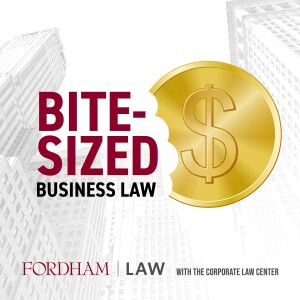
Today, we delve into the captivating world of white-collar crime to pose a question that almost no one is asking. This is not your typical true crime story, but rather one individual’s staggering fall from the C-suite to a prison cell. In this episode, we explore the best ways to punish white-collar crimes and debate whether or not jail is an appropriate or effective solution. Here to contribute his expertise is Fordham Law Professor and resident corporate law expert, Richard Squire. He joins us to share his perspective on the high-profile case of FTX founder Sam Bankman-Fried, who was once lauded as a genius and a leader in the world of cryptocurrency, before being sentenced to 25 years in prison for defrauding customers and investors. Tune in to discover if the criminal justice system's four purposes are met by imprisoning white-collar criminals, the impact of reputational damage, potential alternatives to jail time, and insights into the sometimes severe penalties for insider trading. You’ll also learn about the political incentives for prosecuting white-collar crimes, particularly in emerging industries like crypto, and the conflicts of interest that lawyers should be aware of in these cases. This thought-provoking conversation is packed with valuable insights into corporate law and the ethical challenges of the business world, so be sure not to miss it!
Key Points From This Episode:
- Examples and statistics of the type of white-collar crimes we discuss in this episode.
- An exploration of the best ways to punish those who commit financial crimes.
- The case of Sam Bankman-Fried (SBF) and FTX: a quick refresher on the details.
- Four purposes of the criminal justice system and whether they apply to SBF’s case.
- What constitutes “deliberate intent to deceive” in a fraud case; why it’s so difficult to prove.
- The strength of the case against SBF and questions regarding his long jail sentence.
- Details of the bankruptcy proceedings amidst SBF's legal battles: how this impacted their legal strategy and public perception of accountability.
- Whether or not imprisoning white-collar criminals serves the purposes of criminal justice.
- Pros and cons of the incapacitation that accompanies a prison sentence.
- Political motivations for prosecuting white-collar crimes, like insider trading, especially in emerging industries like cryptocurrency.
- A definition of insider trading and some better-known examples of it.
- Punishment for insider trading: is jail time appropriate or necessary?
- How wealth and public perception contribute to the severity with which a white-collar criminal is punished.
- Alternatives for punishing financial crimes, and when jail time is appropriate.
Links Mentioned in Today’s Episode:
Richard Squire
Richard Squire on LinkedIn
United States v. Samuel Bankman-Fried
United States v. Matthew Kluger
Raj Rajaratnam Insider Trading Conviction
'Inside Insider Trading with Stephen Fishbein'
Amy Martella
Fordham University School of Law Corporate Law Center
More Episodes
 2024-10-08
2024-10-08
 2024-09-10
2024-09-10
 2024-08-27
2024-08-27
 2024-06-28
2024-06-28
 2024-06-04
2024-06-04
 2024-04-23
2024-04-23
 2024-04-09
2024-04-09
 2024-03-26
2024-03-26
Create your
podcast in
minutes
- Full-featured podcast site
- Unlimited storage and bandwidth
- Comprehensive podcast stats
- Distribute to Apple Podcasts, Spotify, and more
- Make money with your podcast
It is Free
- Privacy Policy
- Cookie Policy
- Terms of Use
- Consent Preferences
- Copyright © 2015-2024 Podbean.com






